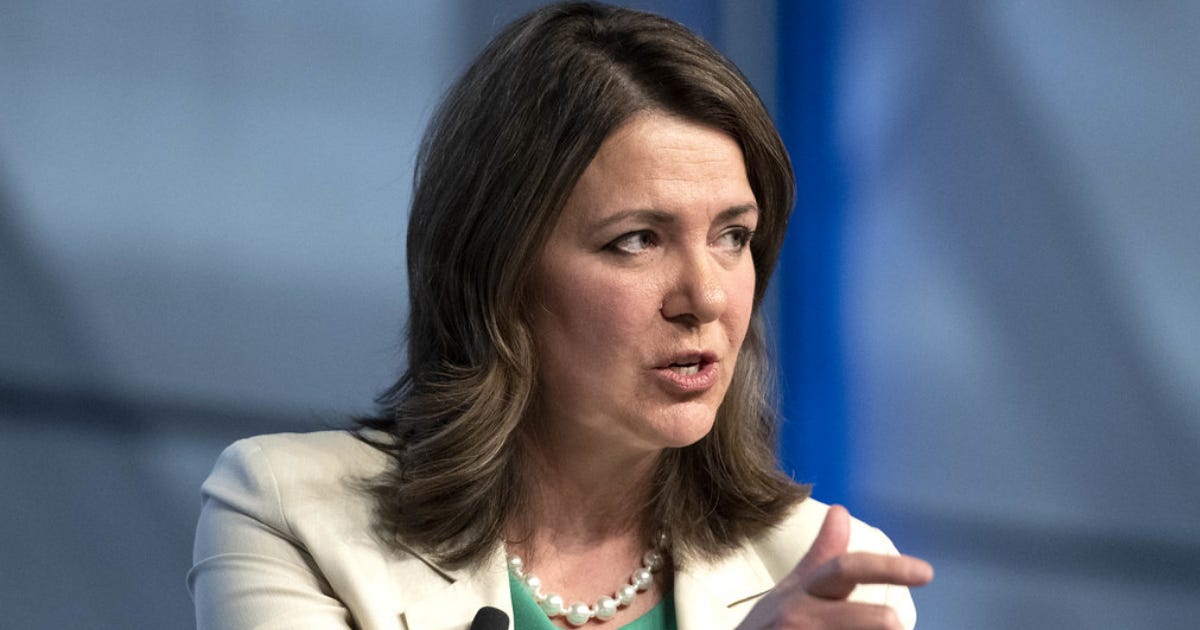BREAKING: Alberta takes lead on new First Nations-backed West Coast pipeline
The Alberta government says it will take the lead in advancing a new West Coast oil proposal, beginning with a technical advisory group involving Indigenous partners and three pipeline companies.
The Alberta government says it will take the lead in advancing a new West Coast oil pipeline proposal, beginning with a technical advisory group involving Indigenous partners and three pipeline companies. Officials said the province will act as proponent until a formal application is approved, after which private investors are expected to take over.
Premier Danielle Smith said on Wednesday that the province’s approach from “Day 1” will ensure Indigenous co-ownership and leadership remain central to the proposal, which is expected to have a formal application by spring 2026.
“This project application is about more than a pipeline; it’s about unlocking Canada’s full economic potential,” Smith said. “Together, we are charting a path to secure Canada’s energy future for generations while bringing the world’s most ethically and responsibly produced energy to market.”
WATCH THE FULL PRESS CONFERENCE AT BOTTOM
Unlike the taxpayer-funded legacy media, Juno News solely depends on the generosity of its readers. Support strong, fearless, independent media. Today only, become a Juno News premium subscriber and save 20% off!
Earlier in the day, B.C. NDP Premier David Eby shot down the proposal. He claimed that the initiative would be funded by taxpayers not only in Alberta, but the whole country.
“This proposal… comes at the expense of real private sector projects that are going to lift our economy and lift the national economy,” he said.
The Deputy Minister for Alberta’s Ministry of Energy and Minerals, Larry Kaumeyer, said at a media briefing that the Alberta government does not intend to own the pipeline, only to get it to the starting gate.
“We are not in the process of having Alberta taxpayers on the hook for owning a pipeline,” he said.
The Alberta government will contribute $14 million toward early planning work, including route assessment, engineering, cost estimates, and Indigenous engagement. The application will be submitted to the Federal Major Projects Office under the Building Canada Act around Spring 2026.
While the Alberta government expects private industry to take over once the project’s application is approved, officials confirmed that regulatory processes like Bill C-48 and the West Coast tanker ban required the government to be involved at this stage.
Regulatory hurdles have been blamed for the failure of several pipeline projects, including Energy East, Northern Gateway, and Keystone XL. Smith said that had these projects progressed, Canada’s GDP would be $55 billion higher every year. Energy officials also cited almost $11.5 billion of capital being moved from Canada to the U.S. over the last three months.
Smith said this project’s success could determine Canada’s future as a country at Wednesday’s press conference.
“This is a Canada project, and this is a test of whether Canada works as a country. Because if we can’t build with a collaboration of the federal government and between provinces, if it’s everybody gets to get their products going to market except Alberta, that’s not a country,” said Smith. “A country is one where we support each other. And I think Canadians are there, and I hope that we can get more and more politicians to get there, too.”
Energy Minister Brian Jean tied the effort to Canada’s global ambitions. He said that increasing market access from Alberta to tidewater will support the federal government’s new goal of turning Canada into an energy superpower.
“We already see Canada as an energy powerhouse, and with the right infrastructure, moving toward superpower status is both realistic and achievable,” Jean said.
Alberta’s press release indicated that the pipeline’s planning will address its path, size, costs, and Indigenous engagement to confirm it serves the national interest.
Energy officials indicated that the pipeline would be 42 inches in diameter, which goes towards B.C.’s West Coast and moves up to one million barrels daily, with potential endpoints in Prince Rupert or Kitimat.
Indigenous co-ownership, partnership, and collaboration were emphasized in the project’s announcement.
“Indigenous leadership and perspectives are essential to guiding major projects like this that will grow our economy, safeguard the environment and create lasting opportunities for Indigenous partners,” reads the press release.
Alberta’s Minister of Indigenous Relations, Rajan Sawhney, confirmed that the project would build partnerships and trust with Indigenous communities from the beginning.
“Alberta’s government is committed to respectful, transparent engagement that recognizes Indigenous communities as rights holders, leaders and owners in the prosperity we build together,” she said.
Help us counter the taxpayer-funded legacy media. Become a Juno News premium subscriber today and save 20% off. Support independent media.
Several Indigenous leaders supported the announcement.
“By working together with government and industry, we can create opportunities that strengthen our communities, while showcasing the incredible potential of Alberta’s energy sector,” said Chief of Fort McKay First Nation, Raymond Powder.
President of the National Coalition of Chiefs Dale Swampy said that oil and gas participation, specifically through ownership opportunities, was a key driver of economic reconciliation.
“We are happy that Alberta is leading an effort to get another pipeline to the West Coast, and we are especially happy that they have decided to engage with Indigenous nations in B.C. and Alberta right from the very beginning of the process,” he said.
The technical advisory group will include representatives from South Bow, Enbridge and Trans Mountain, as well as senior Indigenous and industry leaders. Members include Cenovus executive chair Alex Pourbaix, former Enbridge chief executive Al Monaco, and Chief Jim Boucher of the Saa Dene Group.
“The project of national significance application process will explore all opportunities to deliver Alberta’s responsibly produced energy resources to market, while carefully assessing all aspects required to advance a northwest coastal crude oil pipeline,” reads the press release.
The Alberta government said that Canada has the fourth-largest oil reserves globally and is the fourth-largest producer.
Export of crude oil has climbed from $6 billion in 2000 to $130 billion in 2024.
The additional infrastructure is expected to meet Asian demand from countries like Japan, China, Korea, and India.
Smith said she hoped this project could be on the next list of major projects, set to be announced by the Grey Cup in November.





I agree with Smith . Some body has to call out carnage and his double speak and get the wheels rolling on creating jobs for You and I. Now I know that the road ahead is going to be tuff. But that is life at this present time. An effort has to be made!
Remove the lieberals cult ,and the WEF from CANADA but whatever means necessary.